Why Great Thought Leaders Don’t Play the Publisher’s Game Peter talks with publishing expert Ken…
Leveraging Thought Leadership With Peter Winick – Episode 10 – Mark Jacobs
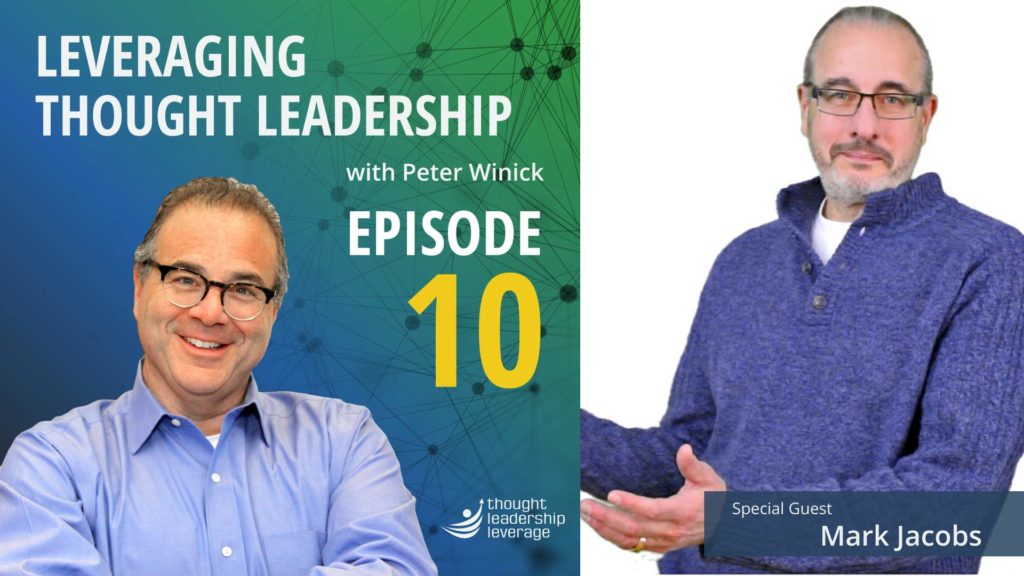
Do you have clarity of vision? Are your teaching tools top-of-the-line? Do your learners quickly understand and utilize your content’s key ideas?
Our guest this week is Mark Jacobs, co-founder and CEO at Me!Box Media. Mark joins Peter to talk about his company’s journey toward creating a collaborative and community-based learning platform.
Mark shares multiple insights about the necessity of building a community of practice, and how community is essential to positioning yourself as an authority in your thought leadership. Listen in for great takeaways on clarity of vision, how having a clearly articulated point of view will grow your audience, and how to enhance your position as an expert in solving your clients’ needs.
If you need a strategy to bring your thought leadership to market, Thought Leadership Leverage can assist you! Contact us for more information. In addition, we can help you implement marketing, research, and sales. Let us help you so you can devote yourself to what you do best.
Transcript
Peter Winick Welcome, welcome, welcome. This is Peter Winick. I am the founder and CEO of Thought Leadership Leverage and this is episode number nine of our podcast Leveraging Thought Leadership. With me today I am delighted to have Marc Jacobs, CEO of and co-founder of Me Box with me. And I have only known each other for a few months, but for some reason he feels like an old friend. We’ve been chatting a lot and sharing all kinds of cool ideas. So welcome aboard, Marc.
Mark Jacobs Hey, Peter. It’s good to hear your voice. What part of the world are you broadcasting from today?
Peter Winick Broadcasting is a strong word. I am in Las Vegas today.
Mark Jacobs Great. Well, I hope things are going well. I know you’ve got a lot of cool things going on out there.
Peter Winick Yeah. Yeah. So let me give everybody Marc’s bio so they know who we’re talking to. So Marc is the co-founder of Mbox Media and the Executive Officer. Prior to that, he was an executive for 18 years and executive leadership doing turnarounds, growth initiatives, participating in cultural changes. You’ve offered over 20 articles and a book on the relationship between strategy, business process and organizational effectiveness. So welcome aboard and tell me what you could add to the conversation of Leveraging Thought Leadership. Maybe we start with a brief description of what me boxes because I think that’ll segway us into where we’re trying to go.
Mark Jacobs All right. Well, great. So first of all, thanks, Peter, for the introduction. And yeah, it does feel like we’ve known each other for a long time. I think we kind of have a similar view of the value of people who are looking at the world, reframing the world, and allowing other people to join in and hopefully be more productive as a result of that. And how difficult it is to get people to join in to that process of reframing. And actually that’s how come we started Mbox during the turnaround years, we saw that organizations get stuck in these horrible habits. And even with the organization bottoming out and it’s very existence being in question, people couldn’t reframe the way that they were behaving and couldn’t see the business differently. And so we came up with a series of processes that that, first of all, weren’t games at the time that we started trying to help people see how their business was running in in the form of a game experience get very popular, whether it be an experiential, you know, go out and do the ropes or whatever. And what we did was we said, No, look, this is pretty serious, folks, because this is about your very survival. And we know that you all are pretty smart and that you’re just in a bad situation and you probably can’t see the world any differently because you’ve been looking at it this way for so long. And so we built a video player that allowed as the sight sound and motion rolled. It allowed people to dig in and question what the Town in Motion was saying. So for instance, we would film a process and we talked to, you know, what are the possibilities of improving the process? And people could stop the player at that point in time, have a discussion. And the reason we did it in video was because many of our plants and our organizations were distributed across the wide geographies. And what we found is by sending teams into different facilities and trying to help walk through the reformation of the facility, we weren’t getting consistency in the communication. And so obviously video, it’s kind of very consistent from play to play and the exercises allowed people then to come to generally the same conclusions across organizations. And we found that the ramp up and the escalation back to profitability and repositioning of the organization just happened more rapidly based on that tool. Right. And you know, the thought leadership side of it never really occurred to us that that’s what we were trying to engage in. And instead of pursuing the business that you’re in, which I think is a hell of a lot more fun and a lot more enticing than working inside organizations that aren’t performing very well. If we would have known that we could make a business out of thought leadership, we’d probably be your competitor instead of your friend.
Peter Winick So but let me let me sort of respond a little bit. So you had a specific business problem. You used video because it’s an effective way to consistently communicate a message and then sort of realized after the fact that that was a form of leadership, right?
Mark Jacobs Yes.
Peter Winick And coming at it from a specific you didn’t come at this from some sort of a theoretical academic that’s like, I’ve got a problem. Here’s a way I think I’m going to fix it. Geez, it worked. Hey, maybe this can help other folks. So that’s sort of a neat approach.
Mark Jacobs Yeah. And what happened was we found out that our organizations were actually forming themselves into communities of practice. And that’s kind of that’s how. Boxes evolved from where it was using this video technique to express completion or actually to express the existence of an issue and then help walk an organization through the evolution out of that situation to now these organizations are stable and they’re throwing off cash. What do you do next? Well, the next thing you do is grow, and that’s where the community of practice concept came in, because obviously healthy communities are growing communities. And instead of growing the business, we grew the community and as a result, the business grew.
Peter Winick So that to me is so exciting. When you and I first started talking months ago, is this concept of a community practice, right? So people are or at least in my world, authors, speakers, lawyers, etc., are always looking for new ways to get the message and the content out. So there’s books and there’s speaking and there’s training and all those things, and everybody adds their different nuance and their expertise to it. But you have a whole sort of new or different, should I say, way of connecting people. So give me a sense of how this is grown and how Mbox is now helping people start with the community of practice. There’s thought leadership and content sprinkled throughout, and it’s a way to leverage and expand the messaging. And another way to get work out and thoughts out and frameworks out.
Mark Jacobs Yeah. So the essence of this is that a thought leader is helping a group of people reframe the way they look at the world. And those people, once they learn how to reframe, now the sudden they’re they have a level of enthusiasm. They’ve learned to collaborate, which is they’ve now come to the party with better thinking. And because they were in a learning environment together, they’ve gotten used to exchanging ideas. And now the community that it’s learned to exchange ideas, it’s learned to exchange ideas with a specific lexicon. That community, then, like most growing organisms, isms, wants to reach for something greater than where it is. And that’s what the whole concept of community is, is it’s a structured approach for a thought leader to once the created that platform around which the new conversation is occurring, it’s now an environment in which that conversation can occur. And the thought leader now owns that category of leadership and it should feel safe and is safe to bring other thought leaders into the conversation as appropriate based on where that organization is trying to take itself and or in our words now that community is trying to take itself. So the thought leader goes from the reframing expert to vision and execution expert. Does that make sense?
Peter Winick Yeah. And it well, what’s amazing about that is the parallel there from adult learning theory. Right? Things have changed a lot. So way back in the Stone Ages when I was in school and certainly when you were in school. Mark Right. The way you quote learned was the teacher got up in front of the room, pushed out a bunch of stuff on Monday that was called the Pretest, and you did horribly on it because you know anything about it. And then they said, okay, study all this stuff and there’ll be a retest on Friday and you’ll do better. And then by Saturday morning you forgot everything. But that’s what we called Learn it. Now we’ve got peer to peer learning. And what we know, particularly in adult learning, is shorten the time frame between theoretical and applied. So don’t just teach a bunch of theory and lock me in a classroom for ten days. How do I use it in the real world against the things that I normally do? And by the way, the people to my left, the people to my right, my colleagues and my peers, either in the same facility as I am or virtually, we can help each other continually learn it, regardless of who’s in the front of the room at that point in time. So I love the community of learning, supporting peer to peer learning and keeping the learning alive After whatever the event might have been, a workshop or someone’s first introduction to the content. So it’s very aligned with sort of the cutting edge thinking in adult learning today, which is awesome.
Mark Jacobs Yeah. And you know, one of the things we’ve learned just as a hitchhike on what you were just saying is the old style of teaching was that in a lot of ways was fear based and wasn’t safe. So people still come to that learning experience unless you can frame it the right way from the start with that with a a type of reserve. And what we wanted was for that reserve to be left out of the room and for it to be replaced with motivation, motivation to improve. And so, you know, you’ve read the articles. They started calling it flip the Class and get into academics, keep it in a number of names. But what we what we found was that by getting the lexicon a baseline, making it safe and then. Providing just enough information to start the conversation around people where people really live and then help them envision where they could get to and live if they wanted to. Then all of a sudden, that journey started to open up. Not just conversations, but it made it safe for people to act. And, you know, along the way. We saw people that just couldn’t make the switch. And it was unfortunate, but we made it safe for them to exit. And what we found is once that momentum began to build, it’s, you know, certain people aren’t going to make the grade. That’s a terrible way to say that, because that’s another fear-based approach. But they weren’t going to they weren’t going to be able to reframe their thinking. They weren’t going to be able to collaborate, which to us meant bring your very best thinking to the table with expectations that once you share, better thinking is going to come out. And that’s the victory. And then what are the action plans on the back end of that? We found that people were then reaching for knowledge so that we could deliver it just as they began to experience things that were beyond their prior experience. And then stead of causing them to have to go out and experiment and try to get better at it, we could offer a series of or a a portfolio of possible solutions people would choose, they would execute. And again, because the conversation was happening, the escalation in performance was just quite frankly, in some of the organizations, it’s been phenomenal. And that’s resulted in scale because, you know, nothing gets people interested in you, like people talking about how successful and engaged and how much energy they have around the fact that they’re achieving something.
Peter Winick Well, the engagement, the achievement are critical. So let me let me ask you this, Mark. For the folks listening out there today, their speakers, their authors, their thought leaders, one of the things that I assume they’re interested in listening to us is scaling and leveraging the message. How do they get it out there? Either for greater monetization to get the message out to more people, etc.. So tell them, you know, they know how to use a speech, they know how to use a book. We would hope. How do I use a community practice? So what do I do with that? And tell me sort of who would benefit the most from the thought leadership side, from the folks listening here and what they would need to be thinking about if they wanted to be considering adding a community practice to their to their toolbox, to their repertoire.
Mark Jacobs Well, from what I’ve seen, from what I’ve seen from the folks that you work with who are for the most part from again, from what I’ve seen, very creative, brilliant. And they have a very they have a they have a clear vision of the problem that they’re trying to solve. And that’s what communities get built around, is the interest in solving a problem. And so as they go from expert at solving the problem as the thought leader to authority and we have a definition of authority, we say that an authority is somebody who’s not only got expertise, but they’ve got the ability not to be an opinion leader, to express themselves in such a way that others enjoy and begin to participate in their point of view. And then as a result, there’s a conversation which moves that point of view to even higher levels. So the first thing, obviously to build a community is to find people who realize or have an inkling anyway that they have a problem which that expert knows how to solve and the expert.
Peter Winick So let me pause you there. So the first piece and you made the assumption that they’ve got a clear vision, the thought leader, as to what the applicant, what the benefit of their work is, what the expertise is, how it works, etc.. That’s not always the case. So one of the things I want to pause here and say, you know, if it’s not, it’s an absolute necessity and a requirement to be able to have that clear articulation. If you’re just some generalist or, you know, motivation or whatever, that’s probably not going to cut the mustard here. You’ve got to have the clear vision. Then where you are going is, you know, they find their people to move in. Give me a sense of the level of specificity around the targeted folks that they want to attract into this community.
Mark Jacobs Well, from our perspective, we ask that we go through a series of exercises that gets very specific and we end up painting an old term. We paint an avatar. And when I say we paint an avatar, I mean we physically paint the avatar and we can and we can the expert can speak as if they are the target client and they can express with empathy and what the pain is that that particular client is experiencing and what they would do or how important it would be for them to solve that pain. And once the expert can. Can walk in in the target markets shoes and clearly express from an emotional perspective the want that that target market has and as expressed in the desire to resolve that problem. That then is the basis of the definition of the category that that expert is going to be operating.
Peter Winick So describe for me then. So now we’ve got the vision. There’s a want and there’s an avatar. Can you can you give me an example of an avatar? Because I’m I’m a big fan of high level of specificity. My biggest nightmare is when a client system is on. My stuff is so good, everybody can benefit from it. I can’t afford to market and reach and attract everyone. And it’s not for everyone. There isn’t any content out there that is equally beneficial to all. So give me an example of what a what a good example of an avatar would be. So one of.
Mark Jacobs The projects that we’re working on is centered on young people moving into roles of leadership and service firms.
Peter Winick So national service, I just I’m just reiterating what you’re saying because it’s giving me the filters. Newly minted leader. Right. So I’m first moving into a leadership role, not in pharmaceutical, not in technology, but in a services business.
Mark Jacobs So and as a result of being a leader in that services business, you will be able to ascend to partnerships. So not only will you be a leader, but now you’ll have financial reason.
Peter Winick I’m now taking on the burden of the we use the example of a law firm after being a great lawyer, but now having to be a business developer, bringing business in the door, whether that’s account or consulting, whatever. Okay. So that’s a real problem. It’s a very specific population goal of.
Mark Jacobs And now speak as if you were the young attorney trying to express himself or I’m sorry, the experts trying to express himself as the young attorney with how he feels about being in the office, how what he knows about the trials and tribulations, no pun intended, of ascending in the organization, the challenges that he has as a young person trying to articulate himself clearly to older attorneys or older accountants or older, in some cases engineers that have a very clear point of view that this is just the way it’s always been done. Not knowing really what the business case is that would cause an older member of the firm to look on the younger person and say, Yes, I can see you as this leader. So just painting this broad picture that becomes that puts the expert in a position where they’re truly feeling the empathy of that specific individual that then becomes the avatar. And from that, you know, what do we get from that? I mean, you know, now the sudden you’re able to express now that you’ve switched your frame as a as an expert moving into the role of those that you’re trying to help. What’s the story that that person is telling you, the expert, and how do you, the expert, then help that person frame themselves so that they can achieve the objectives that are coming clear in the story that they’ve got?
Peter Winick And the power of the fact that we’re defining peers in this way. So everybody in the experience is coming from a similar perspective, right? They might work at different law firms. They might work at the same law firms, whatever. But all the examples that you’re going to come up with and all the one person’s thinking in articulating about a problem, eight other people are probably thinking about it. So the high level of relevance to their world and that’s, you know, voila, that’s sort of the secret recipe for a community, I guess.
Mark Jacobs Absolutely. Now, bingo. Now you’ve got all these young folks that want to ascend to a leadership position. And the question they that they have to wrestle with, can I speak to others that are in potentially competitive environments about my desire to ascend and how they’re doing it? And can we gain the collective wisdom and can this expert turned authority now bring this community along and facilitate a conversation where and this is where the magic happens, where people end up finding themselves, learning from one another and now the expert as an authority because they’re bringing in other people to help the community grow, but the experts not losing that position of authority because they’ve created that community. They keep feeding the community. And in my experience, you know, having had some really great coaches, you don’t turn your back on a great coach because the great coaches keep saying, look, you know what? I appreciate the fact that you served really good, but now you’ve got to get up there at the net. And I’m going to really I’m going to teach you a new skill and I’m not the one that’s going to be able to carry you through the learning of that skill. I need somebody else to do it. And here they are Now, all of a sudden, somebody else has been introduced and you’re thinking, Wow, that coach is really terrific. But it came from the guy that was my original mentor. And so the mentor almost earns the way and we talk a lot about earns the right, they earn the right to be the Socratic leader of that community. And that’s when it starts to scale. When a when somebody whose expertise turns into authority and they can share that position by bringing in other experts in the community themselves, then we begin to see members of the community rise to the level of expert.
Peter Winick Two sides to your definition of community there. There’s these young professionals in this example looking to make partner at the professional service firm. But the other side of that community is I may have been the initial thought leader that put this together, but then realized that there’s a path that this is going where I’m sort of out of gas as the I don’t have much more to add to this. So I’m going to bring in a different expert or another colleague or somebody else to continue to elevate the level of the conversation and the learning and always add value to the community. So it doesn’t always have to be about me.
Mark Jacobs Right? And but as the original expert turned authority, that is your community. And so that’s where the scale continues to happen and that’s where the longevity in our experience in the last few years, the longevity emanates from.
Peter Winick So I love it. I think it’s fun. It’s interesting. I know for a lot of my clients, the fact that it’s not can the fact that there’s it takes on a life of its own it’s evolving probably from an intrinsic or intellectual perspective probably. Be fun and challenging for folks to be leading and to be in a member of the community if you’re committed to learning. What an interesting way to do it.
Mark Jacobs Yeah, absolutely. Because you’re always getting it. At some point it flips. And while you’re still the authority that owns the community, if you will, now you’re, you’re, you’re living. You don’t have to work quite as hard because the rest of the community is creating the energy and you’re standing on that energy and bringing ten additional catalysts to the energy as opposed to have to being the center.
Peter Winick You’re getting all the credit. You created this this great environment in this great party and let the guests mingle, if you will. So who said you have to wrap up in a moment or two here? You get to speak to lots of interesting experts, authors, thought leaders, etc.. And many of them are trying to scale leverage and grow from a financial perspective as well as a messaging perspective. If someone’s out there and they’ve got what it takes, they’re an expert. They’re not a self-proclaimed guru or something. What wisdom would you bestow on them? What advice or 2 or 3 things would you tell them to think about or consider more?
Mark Jacobs Give away what you know, don’t give it. Don’t give the whole process away, but give away pieces based on your understanding of your audience in bite sized chunks so that it’s gluing itself into the head of the audience. And they’re thinking to themselves, there’s a piece that I really get. Here’s another piece that I really get and know that then when it’s time to string those pieces together, they’ll be looking to you because you’ve given them those moments. Don’t be afraid to give those moments away. And you know, there’s other benefits if you’re right, depending on how you write and where you publish and so forth, those moments are usually phrased in such a way that the audience is looking for them and it makes you much more visible.
Peter Winick Got it. And, you know, I’m a big fan of just talking about this with someone the other day of giving it away because, you know, the best example of the value of what you’ve got is a sample of it. Don’t tell me how small you are. Don’t tell me it’s hidden behind door number two you’re giving him. I’ll decide on my own.
Mark Jacobs You know, build some trust with me. Trust me to trust you.
Peter Winick Yeah, I love that. Cool. Any other words of wisdom? Yeah. Give you a call. Give me. My God. I can set that up better. I’ll give it away and then call me. I love that. All right. Well, so working full time you more tell them how to reach you if they’re doing it.
Mark Jacobs Absolutely. You can reach a set me box media.com and the contact and phone numbers are there on the site and or you can hook up with me on LinkedIn Marc Jacobs and gosh that’d be great to hear some from some folks and see how we can be helpful because we believe that our role is to also give it away, earn trust, and then when it looks like there’s real momentum there, everybody gets to win together. And that makes it really cool.
Peter Winick And I would encourage all of you to do that. Mark has something always has something to add to the conversation, and it’s a different perspective than many that we hear in terms of the traditional ways of getting the content. It’s a very different approach. It’s very impactful, it’s very powerful, it’s very engaging. And I think ultimately it’s very profitable. So I want to thank you again for joining us today and sharing all that you’ve shared. I appreciate it. I think you added a lot to the conversation, as you always do. And thank you.
Mark Jacobs Well, thank you, Peter. And it’s kind of nice to get to hang out with a personal hero. So thank you very much.
Peter Winick To learn more about Thought Leadership Leverage, please visit our website at ThoughtLeadershipLeverage.com. To reach me directly, feel free to email me at Peter at ThoughtLeadershipLeverage.com. And please subscribe to Leveraging Thought Leadership on iTunes or your favorite podcast app to get your weekly episode automatically.
Comments (1)
Comments are closed.


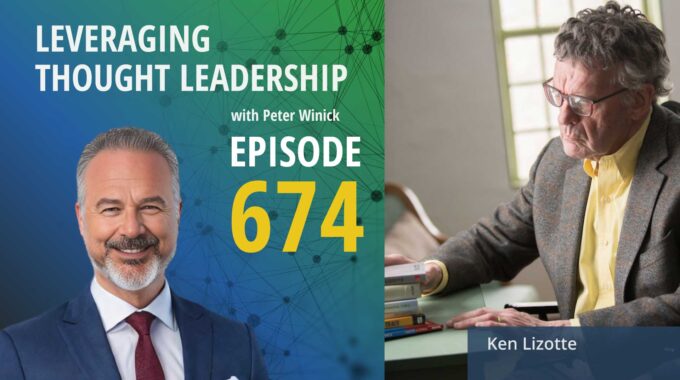
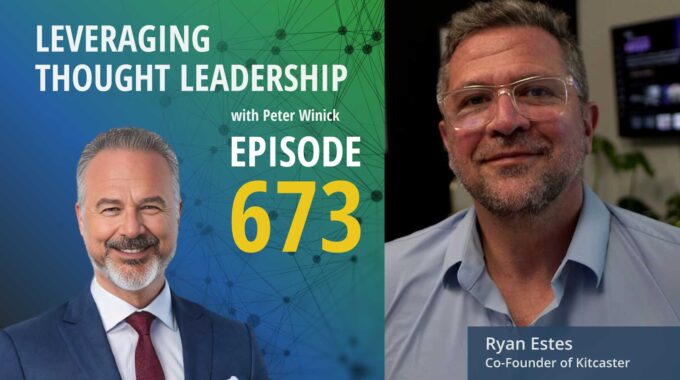
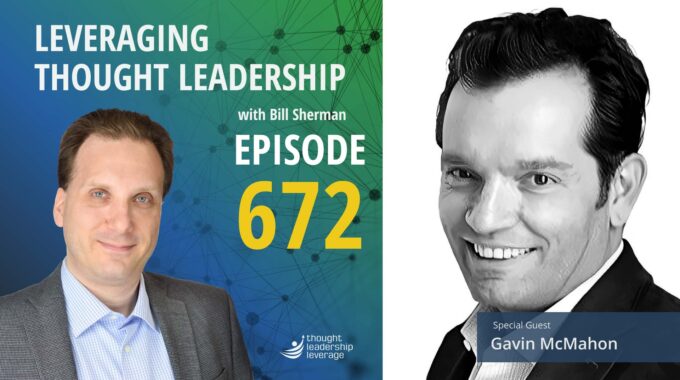
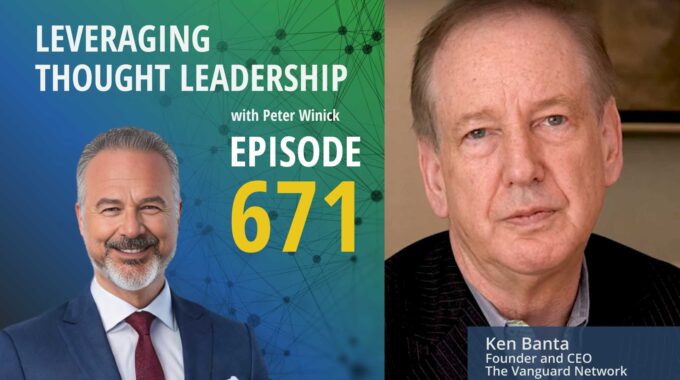
If you are a thought leader and can have a meaningful impact, you need to get to know Peter and Thought Leadership Leverage – they are the Category Leader in helping thought leaders gain traction with large enterprises.